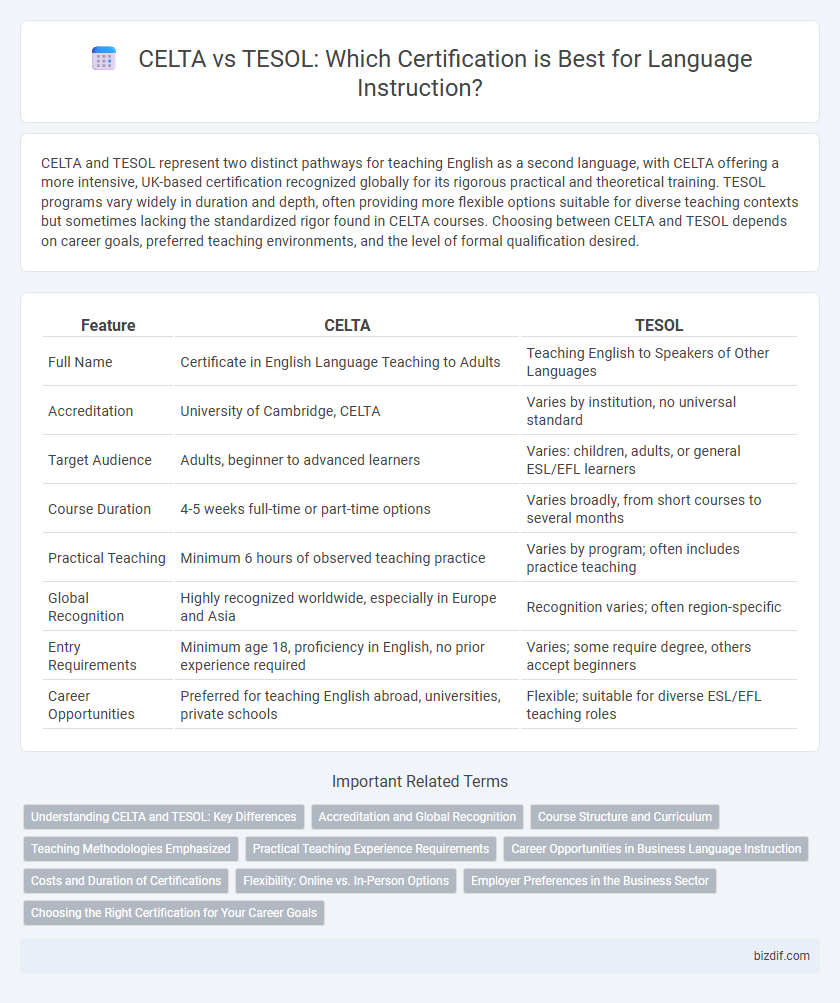CELTA and TESOL represent two distinct pathways for teaching English as a second language, with CELTA offering a more intensive, UK-based certification recognized globally for its rigorous practical and theoretical training. TESOL programs vary widely in duration and depth, often providing more flexible options suitable for diverse teaching contexts but sometimes lacking the standardized rigor found in CELTA courses. Choosing between CELTA and TESOL depends on career goals, preferred teaching environments, and the level of formal qualification desired.
Table of Comparison
| Feature | CELTA | TESOL |
|---|---|---|
| Full Name | Certificate in English Language Teaching to Adults | Teaching English to Speakers of Other Languages |
| Accreditation | University of Cambridge, CELTA | Varies by institution, no universal standard |
| Target Audience | Adults, beginner to advanced learners | Varies: children, adults, or general ESL/EFL learners |
| Course Duration | 4-5 weeks full-time or part-time options | Varies broadly, from short courses to several months |
| Practical Teaching | Minimum 6 hours of observed teaching practice | Varies by program; often includes practice teaching |
| Global Recognition | Highly recognized worldwide, especially in Europe and Asia | Recognition varies; often region-specific |
| Entry Requirements | Minimum age 18, proficiency in English, no prior experience required | Varies; some require degree, others accept beginners |
| Career Opportunities | Preferred for teaching English abroad, universities, private schools | Flexible; suitable for diverse ESL/EFL teaching roles |
Understanding CELTA and TESOL: Key Differences
CELTA and TESOL programs both prepare educators for teaching English as a second language but differ in structure and accreditation. CELTA, administered by Cambridge Assessment English, emphasizes practical teaching skills and requires a minimum of 120 teaching hours, while TESOL programs vary widely in length and content, often offering broader theoretical foundations. Understanding these distinctions helps aspiring teachers select the credential best suited to their career goals and preferred learning approaches.
Accreditation and Global Recognition
CELTA, accredited by Cambridge Assessment English, holds a prestigious global recognition with standardized quality and widespread acceptance in over 60 countries. TESOL certifications, offered by various institutions, vary significantly in accreditation and recognition, affecting their international credibility and job market value. Employers in English language teaching often prioritize CELTA due to its rigorous assessment and consistent quality assurance.
Course Structure and Curriculum
CELTA courses emphasize practical teaching skills through observed teaching practice and input sessions focusing on English language awareness, lesson planning, and classroom management, typically lasting four to five weeks full-time. TESOL programs vary widely but generally include modules on linguistics, second language acquisition theories, and teaching methodologies, often offering flexible durations and formats ranging from short certifications to degree-level qualifications. Both certifications prepare candidates for English language teaching but differ in structure, with CELTA providing a highly standardized, practical approach, while TESOL offers broader academic and theoretical perspectives.
Teaching Methodologies Emphasized
CELTA emphasizes practical, classroom-based teaching methodologies centered on communicative language teaching, incorporating lesson planning, real-time feedback, and observed teaching practice with a strong focus on learner engagement. TESOL programs often provide a broader theoretical foundation alongside methodologies such as task-based learning, differentiated instruction, and incorporation of technology to address diverse learner needs across various contexts. Both certifications prioritize communicative competence but differ in their balance of practical application versus theoretical frameworks in teaching methodologies.
Practical Teaching Experience Requirements
CELTA requires a minimum of six hours of assessed teaching practice with real learners, emphasizing hands-on classroom experience to develop practical skills. TESOL certifications vary widely, often providing fewer or optional practical teaching hours, depending on the program or institution. CELTA's structured and mandatory practical component makes it a preferred choice for those seeking rigorous, experience-based teacher training.
Career Opportunities in Business Language Instruction
CELTA and TESOL certifications both enhance career prospects in business language instruction, but CELTA is often preferred by multinational corporations and language institutes for its practical, classroom-focused approach. TESOL offers broader flexibility, making it suitable for roles in corporate training, online language programs, and international business communication. Employers seek candidates with these certifications to develop tailored language curricula that improve workplace communication and cross-cultural collaboration.
Costs and Duration of Certifications
CELTA certification typically requires a 4-5 week full-time commitment or part-time options extending to several months, with costs ranging from $1,500 to $3,000 depending on the location and institution. TESOL certification varies widely, often offering flexible online or in-person courses lasting from a few weeks to several months, with prices ranging between $200 and $2,000. The CELTA is generally more intensive and costly, while TESOL provides more affordable, diverse options suited to different schedules and budgets.
Flexibility: Online vs. In-Person Options
CELTA offers a structured, in-person training format with limited online options, ideal for immersive classroom experience. TESOL programs provide greater flexibility through extensive online course availability, accommodating remote learners and professionals with busy schedules. Choosing between CELTA and TESOL depends on the learner's preference for face-to-face interaction or adaptable online study methods.
Employer Preferences in the Business Sector
Employers in the business sector often prefer CELTA-certified instructors due to its rigorous, practical training emphasizing real classroom teaching experience and standardized assessment. TESOL qualifications, while widely recognized, vary significantly in curriculum and quality, leading some employers to favor CELTA for its consistent teaching standards. Companies prioritizing effective communication skills and proven teaching methodologies tend to value CELTA certification higher when hiring English language instructors.
Choosing the Right Certification for Your Career Goals
Selecting between CELTA and TESOL certifications depends on your specific career objectives and geographic preferences. CELTA, offered by Cambridge, is widely recognized in Europe and Asia for teaching English to adults, with a strong emphasis on practical classroom skills and observation components. TESOL programs vary globally and cater to a broader audience, including teaching English as a second language to all age groups, often providing flexibility in specialization and delivery format.
CELTA vs TESOL Infographic

 bizdif.com
bizdif.com